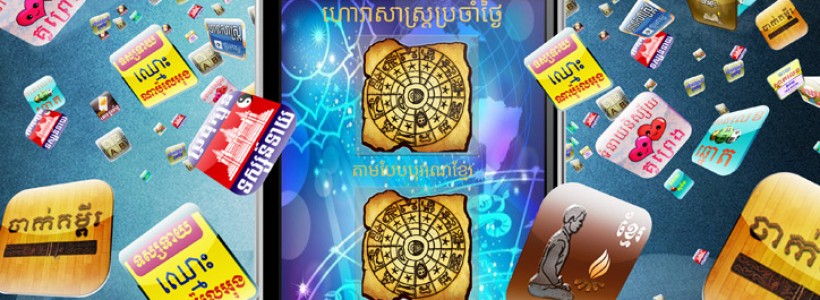My Interview with The Advisor Cambodia:
Digital soothsayers: A new breed of entrepreneur pushes fortune telling into the electronic age

Laptops. Smartphones. A crowded air-conditioned office. Young men gather around to look at a Cambodian game that one of them probably created: cows vs. tigers. Then their interest switches to a 3D image of a witch that pops out of a photograph when they take a picture using a new app. This is the office of the JC IT Company in Phnom Penh, a Japan-Cambodia enterprise that focuses mostly on developing apps for clients in Japan. No one here seems to take fortunetelling seriously.
The lucky SIM card app
Not all Cambodian fortunetelling apps were created by companies. Sok Ratha, a self-taught 34-year-old programmer, made some on his own.
“In 2012 I saw that there is a market for apps because at that time people started using smartphones, but there were not many apps for Cambodian people,” he says. “Then I started learning [how to make apps] by myself.”
The first app he made is called SIM FengShui. It tells you if a new telephone number will be a lucky number for you. Just plug a potential phone number into the app and read the prediction.
“For businessmen, they believe the number is very important for them,” Ratha says. “In the phone shops, they also have a way to calculate if your number is good or bad, so I turned it into an app.”
As for himself, the developer says he believes in fortunetelling 50/50: “You can’t depend on faith. You have to depend on yourself. Just like if you want something, you cannot just sit at home and wait for it to come to you,” he says. “But sometimes, even if you try, you cannot get that thing. It’s 50/50.”
The Palm Tree Leaves app
Another app Ratha made is based on the custom of Khmer palm leaf reading. The way it works traditionally, he explains, is as follows: when you go to a pagoda, there is a stack of palm leaves with stories from the Buddha’s life and the lives of Khmer kings written on them. You place a stack of palm leaves on your head and put a stick into the middle. Then you read the palm leaf that the stick touched and the monks interpret its meaning for you.
To make this app, Ratha copied the text from the palm leaves at one Pagoda in Battambang province.
The ChakKumPy (“Ancient Khmer Palm Leaves Reading”) app works by generating a random number and then the text from a palm leaf that corresponds to it. On a recent test run, for example, the app read, “The ship of Preah Chonok was smashed in the sea and was saved by an angel. Later on, his father gave him the throne. Prediction: This is very good indeed. You will get the support from others if you meet any difficulties.”
More than 150,000 people downloaded the app, according to Ratha’s data. One of these users is 22-year-old Yem Rathana, a university graduate and mother of a nine-month-old baby. Rathana has already heard some memorable predictions from human fortunetellers. When she was getting married, she says, she was told that her marriage would be unlucky unless it took place on a Friday (she followed the advice). And, the fortuneteller warned, either she or her husband would die if her first baby was female (luckily, she had a baby boy).
Unlike a human fortuneteller, however, the app costs nothing and is easy to use. She usually checks it when she wakes up from a dream about a ghost or a car accident, she says.
“I was just looking in the App Store and I found it,” she says. “I don’t use it every day, just when I feel horrible or I feel sad or unhappy, then I go and see. It makes me feel better.”
read the full article here: Digital Soothsayers